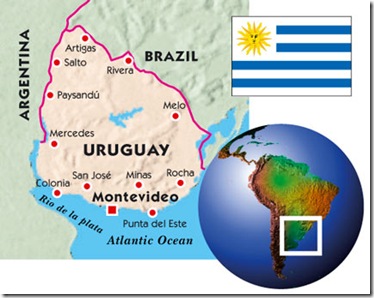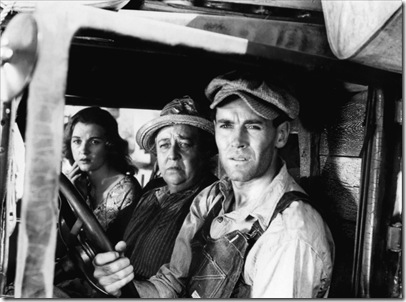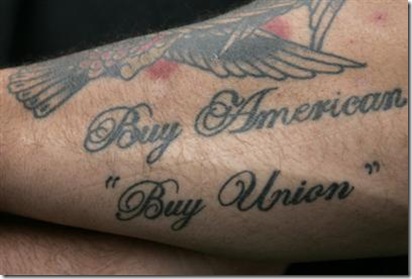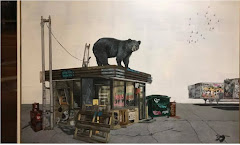This is the story of two Canadian businesses and how they changed over time. One got very big and one didn’t. It isn’t some MBA thesis. It’s just my recollection of the events. But it’s offered as something to consider with regard to what it tells us about the people in those businesses and which of them you think best represents what this country should maybe emulate and be about.
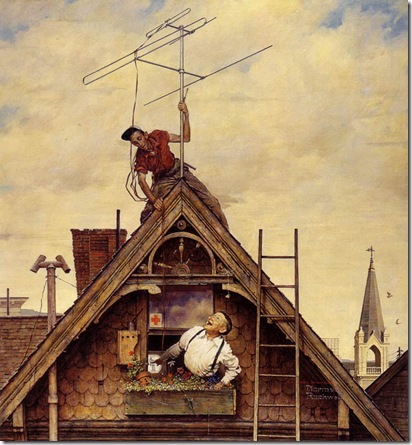
IN THE BEGINNING:
I grew up in South Western Saskatchewan in the 1950’s. The first time I saw television was at the two pump B/A (British American) gas station not far from my home. The two brothers who ran the place had bought a TV set while on a fishing trip to Minnesota, set it up in the station’s front office/store and erected a 30 foot aerial to bring in signals from North Dakota and Montana.
There might’ve been Canadian TV at the time, but those big aerials could only pull in a signal from a few hundred miles away. And there were no Canadian stations within that distance of us.
Since the gas station was right next door to the hockey rink, some of us kids would drop by after the after school game, crawl on the tractor tires that were always stacked in the office and watch some television.
If one of us had a dime, we’d buy a coke out of the cooler or a chocolate bar that got passed around during “Tales of Texas Rangers” or “Mighty Mouse”, the shows that ran in the late afternoon, usually around the time the station signed on for the day. Sometimes, we’d just sit there watching the Indian head “technical difficulties” slide while the station tried to get things up and running.
At night, our places on the tires were taken by farmers, cowboys and hired hands watching “Gang Busters” or “Perry Como”. Somebody usually brought a six-pack to the evening, bottles of which would be discreetly slid out of sight when the Mountie came in to buy gas or a deck of smokes.
Maybe a year later, we got our own TV, which was around the time broadcast stations opened up in Medicine Hat and Swift Current. Suddenly there was local news and weather and sports, farm reports and on Sunday afternoon some old guy who wrote his own songs would turn up on the Swift Current station to play the piano and sing them.
That was the extent of local programming. But it all had a personal connection to everybody who watched.
Back then, the Canadian stations near us didn’t have access to network programming. Film cans would arrive by train. They’d run the show and put it back on the train to the next station in line and await the arrival of next week’s episode.
Often, those shows came with (and were paid for by) embedded ads for products available everywhere like Buicks and Coca-cola and Campbell’s soup. As far as I can remember, there was no such thing as a national newscast, live sports or everybody in the country watching the same episode of anything on the same night.
The business model for Canadian TV was pretty close to the one that supported the brothers who introduced me to television. They both looked at what their audience or clientele needed and supplied it as best they could. One offered news and weather and diversion, the other pumped gas, repaired pick-up trucks and, in winter, trucked fuel oil to the houses and farms where people didn’t burn coal.
Neither had access to any government money and even health care wasn’t paid for back them.

THE FIRST BIG CHANGE:
Canadian television made a quantum leap in the late 1950’s and early sixties. The government built giant microwave towers from coast to coast to coast that were made available to the industry and suddenly we had the CBC, a national newscast, Hockey Night in Canada and live Saskatchewan Roughrider games.
Almost overnight, there was a new delivery system. Film cans didn’t need to be put on trains anymore but there was now film to go with the newscasts – often available the same day as the events that they covered had occurred.
This sudden interconnectedness meant that everybody now got to see the same shows at the same time – or at least on the same night. The programming changed too. There were live concerts on CBC, quiz shows like “Front Page Challenge” and “Fighting Words”, Canadian comedy from “Wayne & Shuster” and live dramas set in Montreal or about Canadian soldiers in WW2.
Something for everybody, encouraging more and more people to buy into the technology.
There were also shows that followed the American episodic model like “Last of the Mohicans”, “Cannonball” and “RCMP”. They were just as slick as the US shows and suddenly us kids were torn between retread western tales we’d seen a million times on “Roy Rogers” or stories we’d never heard about guys like the Mountie we all knew or battles our dads and uncles had been in.
TV overall was more immediate and pervasive. You could watch “Bonanza” in Yellowknife at the same time it was running in Calgary, in fact those Government funded microwave towers had created a delivery system that brought almost anything that was on TV almost anywhere in the country.
We all watched the coverage of the JFK assassination as the story unfolded. We saw Lee Harvey Oswald murdered live on a Sunday evening and the Beatles debut live on “The Ed Sullivan Show” a dozen Sundays later.
Assisted by a delivery system they hadn’t had to pay for, Canadian television stations began to prosper and referring to them as “a license to print money” came into the vernacular.
Meanwhile, the brothers had to cope with an Esso station moving into town and the loss of their fuel oil business. Propane and natural gas had arrived, also from industries who had government help to get it to their customers.
The government didn’t step in to bail the brothers out when most of their business model had been erased, however. So they looked around at what the changing landscape of their town seemed to need and began stocking generic auto parts and selling Japanese motorcycles. Somehow they got by and maybe even did a little better.
By the end of the 1960’s, the CBC was predominantly supported by tax dollars. But they and the private stations still sold local ads or shared in the national ad revenue from the American series they broadcast to expand their programming and services.
Almost every local station still did their own afternoon kid shows and magazine shows featuring hosts who would become Governor Generals and the like. There were more variety shows like “Don Messer’s Jubilee” and more “Wayne and Shuster” and “Front Page Challenge”. But they weren’t doing as many series and those they did were less about entertaining and more about issues, shows about big city Coroners and crusading MP’s like “Wojeck” and “Quentin Durgens”.
Somehow or somewhere it seemed to have been decided that they had to do something different from what Canadians actually wanted to watch.
Those shows didn’t have to make a profit for the CBC and the newly formed CTV network stayed away from them as much as possible, relying on what they brought in from elsewhere while becoming an even more profitable “license to print money”.

AND THEN THINGS CHANGED AGAIN:
Once more, it was the delivery system that evolved. By the early 1970’s, you didn’t need a big aerial or rabbit ears anymore. This little coaxial cable was snaked through a hole in the wall by a guy you usually had to wait for all day to arrive.
But it was worth it, because now you didn’t get snowy pictures or lose the signal entirely when the weather was bad. You got a lot more channels too, sometimes one for each of the 12 numbers on the dial! And from further away too and with even more of the American shows you’d heard about but never actually gotten to see.
Every now and then the guy had to come back to fix something and you had to wait all day for him again. Or you forgot to pay your bill and they turned off the signal. Not getting TV for free was hard to get used to. And paying to watch TV while still having to sit through commercials was a little annoying. But you understood that the TV guy and the cable guy each had to make money so you bought in to the system they had.
The cable companies promised better service and more variety in return for their own “license to print money” which meant having specific territories they could depend on. Semi-monopolies. A part of the country where nobody else could have a cable company.
So the government gave them that. And they also let the Canadian networks “simulcast” meaning replace the broadcasts of the American shows on the cable dial with their own signal, so they got higher ratings and more ad revenue. As additional help, the government also banned Canadian companies from buying commercial time on border stations.
Anything to keep those money presses printing.
Meanwhile, B/A went out of business and the Japanese got national distributors for their motorcycles. Car companies started pushing people to use their service centers instead of local mechanics and natural gas pretty much wiped out what remained of the fuel oil business.
There was no government help for the brothers or the people who now worked for them.
Despite having health care for any stress issues they might have had as a result and a few weeks of unemployment insurance, the brothers just regrouped and turned the garage into a truck wash and a place where long haul truckers could park for the night. The office was refitted with tables and a short order grill that stayed open 24 hours. They didn’t have a license to print money, but they kept people working and kept meeting the needs of their community.

BUT THE ONLY CONSTANT IS CHANGE:
By the time the iPhone and tablet PCs that could stream television shows from the internet arrived, the road where the brothers had built their first truck stop was long gone. So was the truck stop.
The government hadn’t stepped in with hundreds of millions of dollars to help them out the way they were now putting hundreds of millions into Canadian television programming. Despite the fact that those tiny little local TV stations had become giant corporations making hundreds of millions of dollars, the people who owned them and had enjoyed decades of having “a license to print money” insisted they now couldn’t afford to even produce their own local news anymore, let alone any drama or comedy.
They also couldn’t even have stations in a lot of places anymore and certainly couldn’t give Canadians High Definition television until many years after the warranties on the HD televisions most of them already owned had expired.
The men who ran these mega-corporations wore thousand dollar suits and Rolex watches and rolled around in limos and had private elevators to their offices. They bought and sold each others’ companies on a whim and were the toast of Hollywood where they arrived each year with almost a Billion dollars to help people in Hollywood buy fancy homes and swimming pools and bling they could flash on gossip shows. Meanwhile, the people who worked for them wondered if they would have a job in television much longer or could afford to keep paying the rent with what they made from the one they were trying to hang on to.
Whenever those broadcast executives in the fancy suits needed more money, they just marched up to Ottawa with an army of just as fancy lawyers and American media consultants and threatened to put their employees out of work and hold the technological advancement of the country to ransom.
It really was a shame, but a business that had been built on Billions of dollars of taxpayer money, was simply going to have to receive Billions more of it to survive, and even then, that might not be enough.
Meanwhile, the brothers have stopped caring about whether or not they ever see their first dime from the government.
They’re retired now and fishing full time. Despite the lack of government subsidies and not having protected territories for their business or a grant or two when technologies changed, they somehow got by.
You see, when the road closed, instead of crying poor and begging for welfare, they simply looked at where their business and the rest of the world was going and made a few changes.
They took their employees 30 miles away to a highway that wasn’t going anywhere and built a new truck stop. And then they built another and another. They needed to do that because they looked after their customers and they just kept coming back. And the boys also felt obligated to make sure there was a future for all the employees who had helped get them where they were.
By the time they decided they’d rather just go fishing, they had dozens of truck stops that employed almost as many people as the Canadian TV networks.
On the down side, neither of them ever owned a second suit, let alone one that cost as much as their first car. They never owned a watch that could have put one of their kids through school. They never asked a consultant in New York what the guy down the block needed. And nobody in Hollywood ever bought them a drink or a hooker.
SO HERE WE ARE:
Yesterday, our broadcast networks were back in Ottawa to beg for more money. They wore their best suits and made sure they filled up rows of seats in the hearing room with expensive lawyers and high-priced consultants from New York. Mostly they just pointed fingers at people who had the money they didn’t and suggested it should rightfully be theirs.
They needed government money and cable owner money and when they said it might also be nice to have most of the money earned by the people who make their shows, a helpful CRTC Commissioner said, “Well, maybe we can help you out with that…”
What they didn’t want anybody to talk about was that their business model hasn’t been in step with the times for a generation and no matter how much money gets poured in, won’t survive much longer.

MEANWHILE IN LOS ANGELES
The first public test of an internet based television system called Sezmi will roll out today. It’s a system that was first presented to people in the industry a year or two ago at various confabs and conventions. It basically replaces television networks as well as cable or satellite delivery systems.
You buy a set top box that connects to the internet and sends a HD image to your television. You program the embedded DVR to select whatever you want to watch from local or cable television, the internet, movie libraries, web videos, streaming web sites anywhere in the world.
You decide what you want to watch and what you’re going to pay for it. Nobody makes that decision for you or demands money for bundled channels you never tune in or programming you don’t want. Get your news from somebody standing up in Toronto or sitting down in Australia. The choice and what you’re willing to pay for it is completely in your hands.
Sezmi isn’t the only system like this that will become available in the coming months. But it signals the next major evolution in the delivery system which has driven this industry from the beginning.
Watching television continues to get more convenient, more immediate and more user friendly.
But the day of the well-dressed man with his hand in your pocket is at an end.



